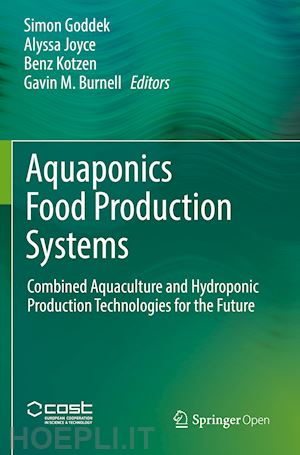
Questo prodotto usufruisce delle SPEDIZIONI GRATIS
selezionando l'opzione Corriere Veloce in fase di ordine.
Pagabile anche con Carta della cultura giovani e del merito, 18App Bonus Cultura e Carta del Docente
This open access book, written by world experts in aquaponics and related technologies, provides the authoritative and comprehensive overview of the key aquaculture and hydroponic and other integrated systems, socio-economic and environmental aspects. Aquaponic systems, which combine aquaculture and vegetable food production offer alternative technology solutions for a world that is increasingly under stress through population growth, urbanisation, water shortages, land and soil degradation, environmental pollution, world hunger and climate change.
PART 1: FRAMEWORK CONDITIONS IN A RESOURCE LIMITED WORLD
1: Aquaponics and Global Food Challenges
2: Aquaponics: closing the cycle on limited water, land and nutrient resources
3: Recirculating Aquaculture Technology
4: Hydroponic Technology
PART 2: SPECIFIC AQUAPONIC TECHNOLOGY
5: Aquaponics: The Basics
6: Bacterial Relationships in Aquaponics: New Research Directions7: Coupled Aquaponic Systems
8: Decoupled Aquaponic Systems
9: Nutrient Cycling
10: Aerobic & Anaerobic Treatments for Aquaponic Sludge Reduction and Mineralisation11: Systems Modelling
12: Aquaponics: Alternative Types and Approaches
PART 3: PERSPECTIVE FOR SUSTAINABLE DEVELOPMENT
13: Fish Diets in Aquaponics
14: Plant Pathogens and Control Strategies in Aquaponics
15: Smarthoods: Aquaponics Integrated Microgrids
16: Aquaponics for the Anthropocene: Towards a 'sustainable first' Agenda
PART 4: MANAGEMENT & MARKETING
17: Insight into Risk in Aquatic Animal Health in Aquaponics
18: Commercial Aquaponics - A Long Road Ahead
19: Aquaponics: The Ugly Duckling in Organic Regulation
20: Regulatory Frameworks for Aquaponics within the EU
21: Aquaponics in the Built Environment
PART 5: AQUAPONICS AND EDUCATION
22: Aquaponics as an Educational Tool
23: Opportunities and challenges in using aquaponics among young people at school - a Danish perspective
24: Aquaponics and Social EnterpriseAlyssa Joyce - Alyssa is an Assistant Professor in the Department of Marine Sciences (aquaculture) at the University of Gothenburg, Sweden. In her group, several researchers are focused on the role of bacterial relationships in nutrient bioavailability and pathogen control in aquaponics systems. She was one of the Swedish representatives to the EU COST Network on aquaponics, and is a partner in the CITYFOOD project developing aquaponics technology in urban environments.
Benz Kotzen - Benz is an Associate Professor and Head of Research and Enterprise in the School of Design, University of Greenwich, London and a consultant landscape architect. He runs the rooftop Aquaponics Lab at the University. He developed and was Chair of the EU Aquaponics Hub, whose remit was to raise the state of the art of aquaponics in the EU and facilitate collaborative aquaponics research. Urban agriculture including vertical aquaponic systems and growing exotic vegetables aquaponically and drylands restoration are key fields of research.
Gavin Burnell - Gavin is an Emeritus Professor at the Aquaculture and Fisheries Development Centre, University College Cork, Ireland and President of the European Aquaculture Society (2018 - 2020). He has been researching and promoting the concept of marine aquaponics as a contribution to the circular economy and sees an important role for this technology in outreach to urban communities. As a co-founder of AquaTT and Editor of Aquaculture International he is excited at the possibilities that aquaponics has in research, education and training across disciplines.










Il sito utilizza cookie ed altri strumenti di tracciamento che raccolgono informazioni dal dispositivo dell’utente. Oltre ai cookie tecnici ed analitici aggregati, strettamente necessari per il funzionamento di questo sito web, previo consenso dell’utente possono essere installati cookie di profilazione e marketing e cookie dei social media. Cliccando su “Accetto tutti i cookie” saranno attivate tutte le categorie di cookie. Per accettare solo deterninate categorie di cookie, cliccare invece su “Impostazioni cookie”. Chiudendo il banner o continuando a navigare saranno installati solo cookie tecnici. Per maggiori dettagli, consultare la Cookie Policy.